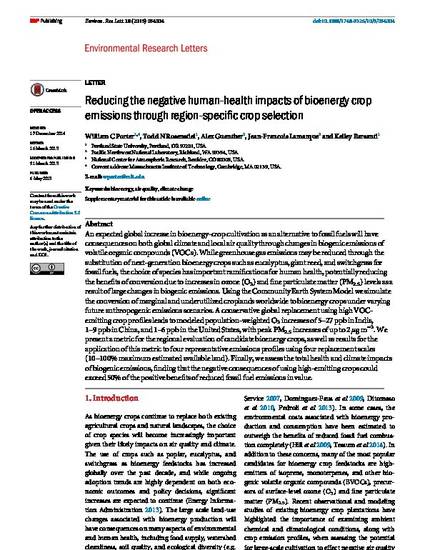
- Biomass energy -- Environmental aspects,
- Renewable energy sources,
- Energy crops -- Environmental aspects,
- Agriculture and energy
An expected global increase in bioenergy-crop cultivation as an alternative to fossil fuels will have consequences on both global climate and local air quality through changes in biogenic emissions of volatile organic compounds (VOCs). While greenhouse gas emissions may be reduced through the substitution of next-generation bioenergy crops such as eucalyptus, giant reed, and switchgrass for fossil fuels, the choice of species has important ramifications for human health, potentially reducing the benefits of conversion due to increases in ozone (O3) and fine particulate matter (PM2.5) levels as a result of large changes in biogenic emissions. Using the Community Earth System Model we simulate the conversion of marginal and underutilized croplands worldwide to bioenergy crops under varying future anthropogenic emissions scenarios. A conservative global replacement using high VOCemitting crop profiles leads to modeled population-weighted O3 increases of 5–27 ppb in India, 1–9 ppb in China, and 1–6 ppb in the United States, with peak PM2.5 increases of up to 2 μg m−3 . We present a metric for the regional evaluation of candidate bioenergy crops, as well as results for the application of this metric to four representative emissions profiles using four replacement scales (10–100% maximum estimated available land). Finally, we assess the total health and climate impacts of biogenic emissions, finding that the negative consequences of using high-emitting crops could exceed 50% of the positive benefits of reduced fossil fuel emissions in value.
 Content from this work may be used under the terms of the Creative Commons Attribution 3.0 licence. Any further distribution of this work must maintain attribution to the author(s) and the title of the work, journal citation and DOI.
Content from this work may be used under the terms of the Creative Commons Attribution 3.0 licence. Any further distribution of this work must maintain attribution to the author(s) and the title of the work, journal citation and DOI.
